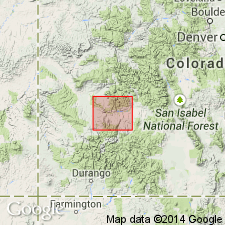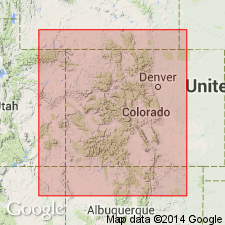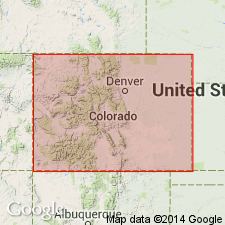
- Usage in publication:
-
- Powderhorn granite group*
- Modifications:
-
- Named
- Dominant lithology:
-
- Granite
- AAPG geologic province:
-
- Southern Rocky Mountain region
Summary:
Type locality not designated. Probably named for Powderhorn, T48N, R2W, Gunnison Co, CO in Southern Rocky Mountain region. Is largest continuous granite body in region. Extends with interruptions ll mi along Cebolla Creek. Outcrop in places is more than 6 mi wide. Northern boundary runs north of west from a point 2 mi south of Midway, in a sharp, straight contact with Dubois greenstone as far as Cebolla Creek. In addition to main body there are a number of smaller, isolated masses. Extent of the mass to north and southwest unknown. Ranges from granite porphyry to coarsely porphyritic granite. Is massive to granular to highly gneissoid and banded. Consists of quartz, microcline, biotite, and varying amounts of soda plagioclase and orthoclase. Is cut by and is older than pyroxenite and syenite of Iron Hill area. Is cut by and younger than Dubois greenstone. Assigned to pre-Cambrian.
Source: GNU records (USGS DDS-6; Denver GNULEX).

- Usage in publication:
-
- Powderhorn Granite*
- Modifications:
-
- Overview
- AAPG geologic province:
-
- Southern Rocky Mountain region
Summary:
Application on recent maps restricted as compared with original usage. Age assignment with granitic rocks of circa 1,700 m.y. (Precambrian X) age group based on similarities in character and habit to granites dated by Wetherill and Bickford (1965).
Source: GNU records (USGS DDS-6; Denver GNULEX).

- Usage in publication:
-
- Powderhorn Granite*
- Modifications:
-
- Revised
- Overview
- AAPG geologic province:
-
- Southern Rocky Mountain region
Summary:
Is one of nine formally named lithodemic units assigned to the Early Proterozoic Routt Plutonic Suite (new name). Occurs in several grossly concordant bodies in Gunnison River area in Southern Rocky Mountain region. Is a metavolcanic unit of pink to gray, medium- to coarse-grained gneissic porphyritic biotite granite.
Source: GNU records (USGS DDS-6; Denver GNULEX).
For more information, please contact Nancy Stamm, Geologic Names Committee Secretary.
Asterisk (*) indicates published by U.S. Geological Survey authors.
"No current usage" (†) implies that a name has been abandoned or has fallen into disuse. Former usage and, if known, replacement name given in parentheses ( ).
Slash (/) indicates name conflicts with nomenclatural guidelines (CSN, 1933; ACSN, 1961, 1970; NACSN, 1983, 2005, 2021). May be explained within brackets ([ ]).

